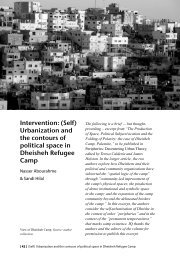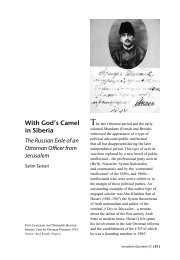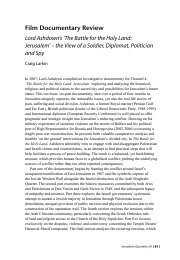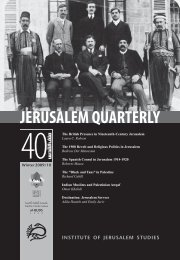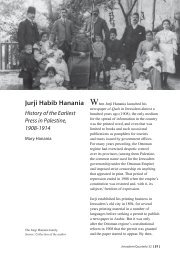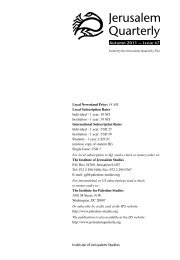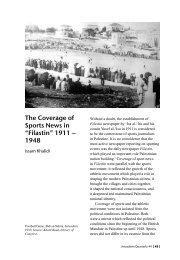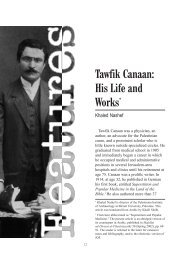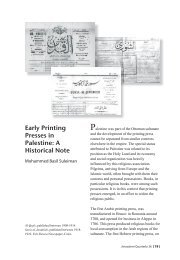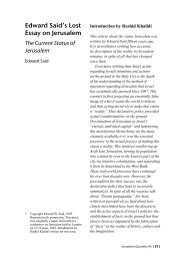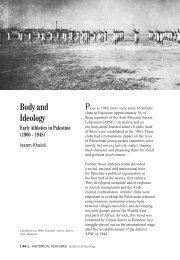PLUNDERING PALESTINE - Jerusalem Quarterly
PLUNDERING PALESTINE - Jerusalem Quarterly
PLUNDERING PALESTINE - Jerusalem Quarterly
Create successful ePaper yourself
Turn your PDF publications into a flip-book with our unique Google optimized e-Paper software.
of the book alone, and for the libraries’ owners also there is no need to go<br />
into more detail. Taking into account that our work is currently not being<br />
carried out in the National Library itself, and since it is possible that the<br />
books will once again be placed in crates and carried to Mount Scopus, it<br />
would be advisable to mark each book with the same number that would<br />
appear on the lists… in order to make it easier to select the books we are<br />
to receive as a fee for our services – if such an arrangement is agreed upon<br />
– the list should be divided according to the subjects the books belong to,<br />
such as old and modern literature, humanities, sciences, etc. 16<br />
The expression “The National Library has been granted the right” is very important,<br />
because it indicates that the collection of books has been carried out with official<br />
and military permission. It is also important because of its sanctimonious tone,<br />
which bleaches the sin by turning the library into a passive body. However, I want to<br />
concentrate on what I feel is the most important concept in this letter, the term “fee<br />
for services rendered”. How are we to understand it? Is this a spectacular display of<br />
sophisticated apologetics, the rhetorical trick of an administrator conscious of the fact<br />
he is writing an official, perhaps even public, document and who is therefore trying<br />
to conceal his eagerness to adopt the books under the cloak of future distribution<br />
arrangements? Alternately, is it possible that Strauss honestly believed that the<br />
National Library had performed an act of grace and salvation, and therefore deserved<br />
a reward for its efforts? Either way, it is clear that Strauss, like his colleagues,<br />
recognized the value of the books, coveted them, and had no intention of giving them<br />
up easily. If we have any doubts, the following sentences in the memo make this clear:<br />
If a substantial number of these books is given to the National Library, we<br />
would be able to dramatically expand our research opportunities. Doubtless,<br />
we have first to bring into the National Library those books that are not<br />
currently in our possession. As for the other books, we are mainly interested<br />
in classical literature publications… examining the books that have come<br />
into our hands therefore requires library processing with exact awareness<br />
of our needs, and it should be noted that in this aspect, the Eastern Department<br />
at the National Library far surpasses similar institutions in the rest of<br />
the Near East countries that, although they are wealthy in books, are not<br />
adequately organized and do not allow the reader and the researcher the<br />
kind of work that can be done here. 17<br />
The conditional that appears at the beginning of the quote should not distract us from<br />
the fact that Strauss had a solid answer to the question of what should be done with the<br />
books; in fact, it underscores it.<br />
<strong>Jerusalem</strong> <strong>Quarterly</strong> 33 [ 15 ]


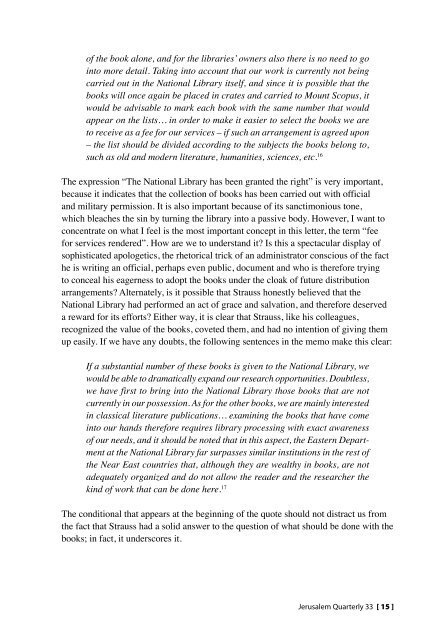
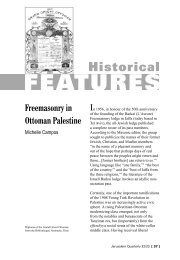
![In Search of Jerusalem Airport [pdf] - Jerusalem Quarterly](https://img.yumpu.com/49007736/1/180x260/in-search-of-jerusalem-airport-pdf-jerusalem-quarterly.jpg?quality=85)
